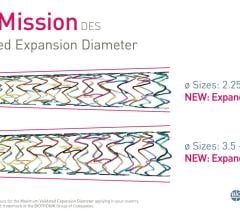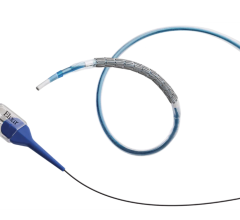December 26, 2007 - Boston Scientific Corp. announced its TAXUS Liberte paclitaxel-eluting coronary stent system has received European CE Mark approval for use in patients with diabetes.
Boston Scientific submitted data showing the TAXUS Liberte stent has benefited diabetic patients with coronary artery disease, both in clinical trials and real-world registries. This approval means the TAXUS Liberte stent system now has more CE Mark- approved indications than any other drug-eluting stent, allowing treatment of a wide range of patients including many of those at high risk. The TAXUS Liberte stent system is the most frequently used drug-eluting stent system in Europe.
"Achieving CE Mark approval for TAXUS Liberte in patients with diabetes is an important milestone," said David McFaul, Boston Scientific Senior Vice President, International. "As a leader in devices for the treatment of cardiovascular disease, Boston Scientific's goal is to provide patients with the most advanced treatment options available. In this case, we are offering another specific solution for diabetic patients outside the United States, who are typically at higher risk for adverse events compared to non-diabetic patients."
Combined data from four TAXUS ATLAS trials supported the efficacy and safety of the TAXUS Liberte stent system in diabetic patients. The trials examined 1,529 patients treated with the TAXUS Liberte stent system, 413 of whom had diabetes, and reported similar rates of target lesion revascularization (TLR, or retreatment), cardiac death, myocardial infarction (MI, or heart attack) and stent thrombosis (clotting) between diabetic and non-diabetic stent recipients after adjustment for differences in risk at baseline.
Diabetes affects more than 200 million people worldwide and is expected to affect 360 million people by 2030. Approximately half of all patients presenting with coronary artery disease (CAD) in Europe have diabetes.(4) Diabetic patients with CAD often have poorer outcomes after revascularization procedures because their blood vessels tend to build up more plaque than the vessels of non-diabetic patients, and their CAD advances more quickly. CAD is the most common cause of death among European adults with diabetes.
As a result of the expanded CE Mark, the TAXUS Liberte stent system in the European Union is indicated for treatment of de novo and restenotic lesions or total occlusions in patients with coronary artery disease - angina; silent ischemia; acute myocardial infarction - to improve luminal diameter and reduce restenosis within the stent and at the stent edges in native coronary arteries. The TAXUS Liberte stent system is also indicated for patients with concomitant diabetes mellitus as well as treatment of abrupt or threatened closure in patients with failed interventional therapy.
The TAXUS Liberte stent is available outside the United States in a wide range of sizes to treat a diversity of vessel sizes and lesion lengths seen in patients with coronary artery disease.
The TAXUS Liberte stent system is pending approval by the U.S. Food and Drug Administration and is not available for sale in the United States.
For more information: www.bostonscientific-international.com


 July 02, 2024
July 02, 2024 









